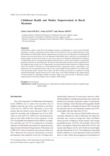Childhood Health and Mother Empowerment in Rural Myanmar
| ISSN | 00213551 |
|---|---|
| 書誌レコードID(総合目録DB) | AA0068709X |

Child health is often a weak link in developing countries, and Myanmar is a case in point. Broadly speaking, a mother’s education has been shown in the literature to be an important factor in the determination of child health. But the empowerment of women over the allocation of intrahousehold resources has also been shown to be an important child health factor, and thus an accumulation of human capital. In the present study, we use survey data on an important anthropometric indicator of child health and its associated household characteristics to specify and estimate a child-health production function in rural Myanmar. We then use this production function to draw implications for the height-for-age growth curves. Importantly, our questionnaire-based indicator of empowerment shows the mother’s influence over household decisions regarding income, expenditures, and education to be an important factor in the Z-score of the height-for-age indicative of a child’s long-term nutritional status. Nearly 30% of girls and 48% of boys are found in a condition of being stunted nutritionally, and the growth curves come closer to the WHO standard as the empowerment of women improves. Although a number of women rights were achieved early in Myanmar, greater empowerment in the home remains a key to improve child welfare.
| 刊行年月日 | |
|---|---|
| 作成者 | Chisa NAKAMURA Yoko SAITO Thuzar SHWE |
| 著者キーワード |
bargaining power child nutrition health production function height-for-age human capital |
| 公開者 | Japan International Research Center for Agricultural Sciences |
| 受付日 | 2019-03-20 |
| 受理日 | 2019-08-08 |
| オンライン掲載日 | |
| 巻 | 54 |
| 号 | 3 |
| 開始ページ | 253 |
| 終了ページ | 262 |
| DOI | 10.6090/jarq.54.253 |
| 言語 | eng |
